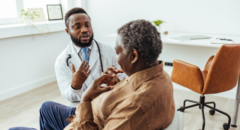
Typically, being diagnosed with lung cancer means that there is a tumor in your lung. The cancer cells may or may not have spread to surrounding organs depending on the stage of your disease so your doctor will need to find out. According to the Centers for Disease Control and Prevention, Blacks have a higher risk of developing lung cancer than other ethnicities. In fact, Black men make up the highest percentage of people who are getting diagnosed with the disease. While there are multiple factors that lead to this happening, you can expect to make different changes to your life as you undertake treatment and recovery. By doing this, you’ll ensure that you live well.
1. You’ll Have A Schedule For Doctor’s Visits
When you go to your first doctor’s visit, there will be a lot of information to process.
One thing you should expect is a schedule of when you’ll have to see the doctor again. Apart from follow-up tests, you’ll need to discuss everything about your treatment options.
2. You’ll Likely Work With A Team Of Specialists
While you’re working with an oncologist for your cancer, you’ll also need specialists who focus on the lungs and heart.
Additionally, different oncologists handle radiation and chemotherapy treatments. If you need to undergo surgery, you’ll meet with a thoracic surgeon.
RELATED: Self-Care Tips For Patients on Immunotherapy
3. You Might Need Different Treatment Options
Your doctor will use the information about the stage and type of your lung cancer to determine your treatment.
Unfortunately, that doesn’t mean you’ll only need one treatment. That’s one of the reasons you’ll have multiple follow-up doctor’s visits to see if the treatment is working.
RELATED: Depression Can Worsen Your Lung Cancer: Here’s How to get Help
4. You Have To Be Prepared For Side Effects
The treatments for lung cancer include chemotherapy, immunotherapy, and radiation therapy among others. All of these options have side effects that you should discuss with your doctor. While talking about what to expect, you should ask how to manage them. Some of them can
be handled with rest while others may need medical intervention.
5. The Side Effects May Last A Lifetime
According to recent studies, the side effects that you can experience from lung cancer treatments might not be limited to the treatment period.
In fact, some side effects have been shown to appear after the therapy has ended. Some treatments may even make you more likely to develop chronic illnesses so get all the information from your doctor.
Breathe Easier: 10 Everyday Ways To Open Your Lungs
6. How You Exercise Will Change
Believe it or not, being physically active is a core part of recovering from lung cancer. It may be hard given how hard it can be to breathe but your doctors will have a plan in place for that. This plan will usually include specific breathing exercises to build your lung capacity as well as a schedule to start an approved exercise routine.
RELATED: 5 Veggies That Boost Lung Function
7. You’ll Need To Make Some Lifestyle Changes
As you might expect, smoking when you have lung cancer is a no-no. Apart from walking away from cigarettes, you’ll need to cut back on the alcohol as well.
While there’s no specific lung cancer diet, doctors recommend cutting the processed, high-sugar, and high-fat foods out of your meals. Your overall health will benefit from a diet filled with fruits, vegetables, lean proteins, low-fat dairy, and whole grains.
8. You Might Have To Consider Palliative Care
Many people think that palliative care is reserved for people who are looking for end-of-life accommodations but that’s not the case. It’s great for anyone who needs help with taking care of their daily needs and would like well-rounded 24-hour attention. Palliative care often includes the services of physical therapists, nurses, nutritionists, and counselors.
Living well with lung cancer might not be easy but it’s possible if you listen to your doctor and make certain changes to your life. While you’re on your journey, don’t forget to pay attention to your mental health. If you find support groups and talk to friends or loved ones, it can make things much easier to handle.









